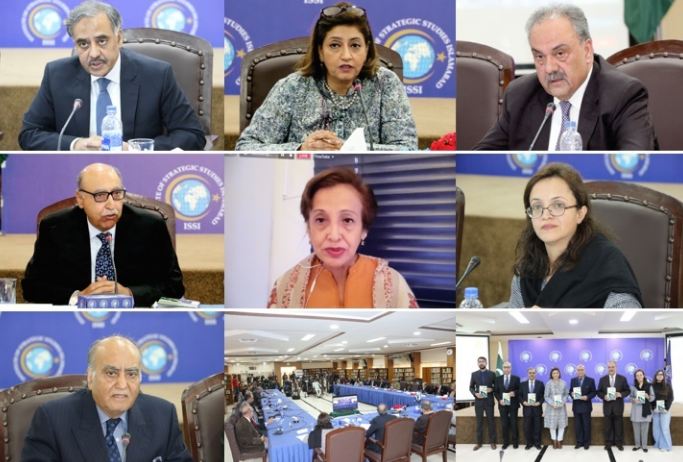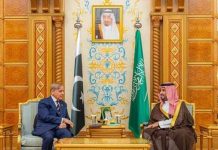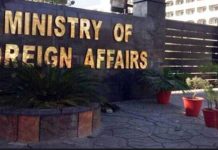By Dr. Huma Baqai
ISLAMABAD, NOV 14: The Centre for Strategic Perspectives (CSP) at the Institute of Strategic Studies Islamabad (ISSI), organized a book talk on Dr. Huma Baqai’s book titled “Collected Works on Foreign Affairs and Security Policy.” The discussants at the Book Talk included: Ambassador Tehmna Janjua, Former Foreign Secretary of Pakistan; Ambassador Asif Durrani, Pakistan’s Special Representative on Afghanistan; and Ambassador Abdul Basit, Pakistan’s Former High Commissioner to India. The discussion was also attended by academics, practitioners, former and current Pakistani diplomats and officials, experts from think tanks, students, and members of the diplomatic corps based in Islamabad.
In her introductory remarks, Dr. Neelum Nigar, Director, CSP said that Dr. Baqai’s extensive body of work stands as a testament to her dedication to unraveling the complexities of foreign affairs and security policy. Through meticulous research, thoughtful commentary, and a deep understanding of the geopolitical landscape, Dr. Baqai has provided us with invaluable insights that resonate with the pulse of our times.
In his welcoming remarks, DG ISSI Ambassador Sohail Mahmood said that Dr. Huma Baqai represent an authentic, home-grown Pakistani voice on global and regional developments. The analysis in her book meticulously considers both domestic and external factors, focusing exclusively on Pakistan’s ‘interests’. Ambassador Sohail Mahmood highlighted five pivotal points from the book, including the urgent need for Pakistan to acknowledge and respond to the profound transformation of the world; the serious implications of major-power competition in South Asia and the growing Indian role in the U.S. grand strategy as well as its assigned role in the ‘Indo-Pacific’ construct – having implications for Pakistan. He also underscored the significance of the China-Pakistan partnership, exemplified by the China-Pakistan Economic Corridor (CPEC) and close collaboration on regional issues. He further highlighted the Book’s focus on the rise of China, the emerging dynamics of a ‘new cold war’, and its advice to avoid major power confrontation. Lastly, he noted the author’s emphasis on Pakistan’s transition from a ‘geostrategic’ to a ‘developmental’ state and suggested that in her future writings Dr. Huma Baqai may also share her thoughts on operationalizing the pivot to geo-economics while managing the complex geo-politics.
Ambassador Janjua, in her insightful remarks on the book, emphasized its role in fostering discussions on various issues concerning both Pakistan and the global landscape. The book particularly underscores the overarching issues in the current global environment, dominated by the escalating rivalry between the U.S. and China. It delves into the nature of this rivalry, its impact on the region, and potential responses by Pakistan. Ambassador Janjua noted the book’s suggestion that, amid great-power politics, Pakistan should steer clear of aligning with any specific camp. However, she stressed the increasing importance of addressing the challenges associated with maintaining such a balance and the importance of close coordination among all relevant institutions and stakeholders.
Ambassador Durrani, in his commentary on the book, highlighted its role as a comprehensive compilation addressing the diverse challenges Pakistan is currently encountering. These challenges span bilateral, regional, and global dimensions, covering crucial topics such as CPEC and Pakistan’s security paradigm. The book serves as a valuable resource, offering insights into the emerging issues faced by Pakistan and providing a guide to understanding international developments over the past five years. Encompassing a broad spectrum, it delves into topics ranging from Pakistan-U.S. relations, Pakistan-India relations, Afghanistan, South Asia, and the Middle East, to the dynamics with Euro-Pacific allies.
Ambassador Basit, in his commentary, expressed appreciation for the book as a valuable addition to the existing literature addressing Pakistan’s intricate foreign policy and security challenges. Shedding light on the hurdles surrounding Pakistan’s foreign policy, he noted that although the country has clear foreign policy objectives, there’s room for improvement in effectively utilizing its foreign policy options. Drawing attention to specific articles in the book, Ambassador Basit emphasized that geo-economics must be considered within a broader context and not in isolation. Regarding global politics and alliance structures, he acknowledged that the world operates in camps, and Pakistan, like other nations, cannot overlook the strategic partnership it holds with China.
Dr. Huma Baqai, in her exposition of the book, illuminated its focus on Pakistan’s foreign, domestic, and security policies within the context of various constraints and compulsions. Despite facing numerous challenges, Pakistan has effectively safeguarded its core interests. Dr. Baqai emphasized that these challenges have significantly influenced all facets of Pakistan’s foreign policy, shaping its relationships with key nations such as Afghanistan, the United States, and India, and its engagement with global alliance structures. She underscored the intricate interplay of geopolitics and geo-economics in the contemporary world. Dr. Baqai underscored the need for Pakistan to navigate this complex terrain, balancing its strategic objectives with the constraints posed by the global geopolitical landscape. By delving into the multifaceted dimensions of Pakistan’s policies, Dr Baqai’s book offers valuable insights into the nation’s diplomatic, security, and economic challenges and successes within the dynamic international context.
The interactive discussion was moderated by Ambassador Sohail Mahmood. During the discussion, various issues of significance were explored. The topics ranged from the China-Pakistan Economic Corridor, Pakistan’s political landscape, and dynamics in Afghanistan, to the unresolved Jammu and Kashmir dispute. The discourse also delved into the intricate web of Pakistan-India relations, events in the Middle East, the war in Gaza, and the emergence of knowledge economies. The breadth of the discussion highlighted the diverse and complex challenges that resonate both regionally and globally.
A vote of thanks was made by Ambassador Khalid Mahmood, Chairman Board of Governors ISSI.

















